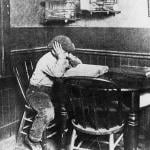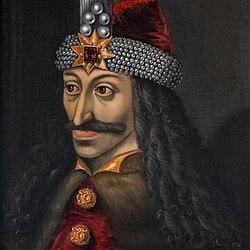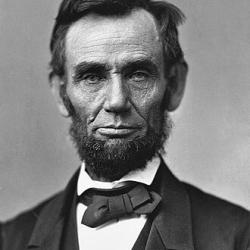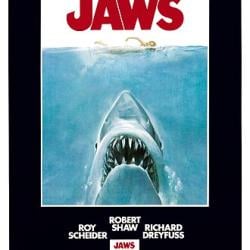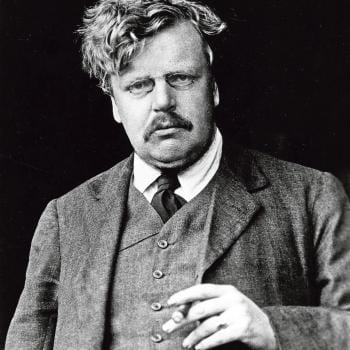I thought it important as a Catholic blogger to say something on the start of the Conclave. I had 90 minutes to complete this before I needed to go to work. So here is what I came up with. This is what happen in the last 12 popes leading up to 2025.
NOTE: All descriptions taken from Wikipedia
Vatican 1 Popes
Papal Conclave of 1846
- Ballots: 4
- Days: 2
The papal conclave held from 14 to 16 June 1846 saw the election of Cardinal Giovanni Mastai-Ferretti to become pope in succession to the recently deceased Gregory XVI. 50 of the 62 cardinals participated in the balloting. This conclave was the last to elect a ruler of the Papal States, the extensive lands around Rome and Northern Italy which the Catholic Church governed until 1870. Mastai-Ferretti was elected on the fourth ballot and took the name Pius IX.
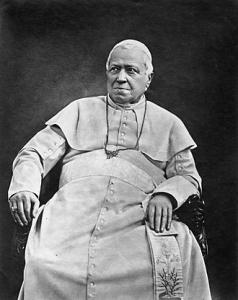
Bl. Pius IX
Pope Pius IX was crowned with the papal tiara on 21 June 1846. He became the longest-reigning pope since Saint Peter, sitting on the papal throne for nearly 32 years.
Subject and later the last sovereign of the Papal States, finally becoming an Italian citizen. Defined the dogmas of Immaculate Conception and papal infallibility. Issued the controversial Syllabus of Errors (1864). Opened the First Vatican Council (1869). Lost the Papal States to Italy (1870). Longest-reigning pope since Peter (c. 30–64); longest verified reign. First pope to be photographed.
During his pontificate, Augustinian friar Gregor Mendel published the “Experiments on Plant Hybridization” and Charles Darwin published On the Origin of Species. At that time, no high-level Church pronouncement attacked head-on the theory of evolution as applied to non-human species.
Even before the development of the scientific method, Catholic theology had allowed for biblical texts to be read as allegorical rather than literal where they appeared to contradict that which could be established by science or reason. Thus, Catholicism has been able to refine its understanding of scripture in light of scientific discoveries.
- September 19 – Our Lady of La Salette, a Marian apparition, is said to have been seen by two children at La Salette-Fallavaux in France.
- September 23 – Discovery of Neptune: The planet is observed for the first time by German astronomers Johann Gottfried Galle and Heinrich Louis d’Arrest, as predicted by British astronomer John Couch Adams and French astronomer Urbain Le Verrier.
Papal Conclave of 1878
- Ballots: 3
- Days: 2
The papal conclave held from 18 to 20 February 1878 saw the election of Cardinal Gioacchino Pecci to become pope in succession to the recently deceased Pius IX, who had had the longest pontificate since Saint Peter. 61 of the 64 cardinals participated in the balloting. It was the first election of a pope who would not rule the Papal States and the first to meet in the Apostolic Palace in the Vatican, since the venue used earlier in the 19th century, the Quirinal Palace, was now the palace of the king of Italy, Umberto I. Pecci was elected on the third ballot and took the name Leo XIII.
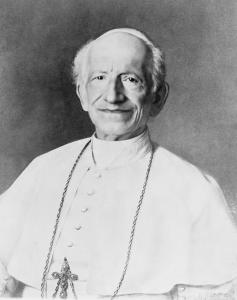
French citizen of Italian ethnicity, later becoming a subject of the Papal States and finally an Italian citizen. Issued the encyclical Rerum novarum (1891), supporting Christian democracy against Communism. Third-longest reigning pope after Pius IX and John Paul II, excluding Peter. Promoted the rosary and scapular. Approved two new Marian scapulars; first pope to completely embrace the concept of Mary as a mediatrix. First pope to be filmed using motion picture camera (1898) and first pope with voice recorded. Oldest verified pope in office.
Though always seemingly in poor health and delicate condition, Leo reigned for 25 years. He had the third longest reign of any pope until that time. Leo XIII was later surpassed by Pope John Paul II, who reigned for 26 years and six months from his election in October 1978 to his death in April of 2005. When Leo XIII died on 20 July 1903 at the age of 93, he had lived to be older than any of his known predecessors.
January 28 – In the United States: The world’s First Telephone Exchange begins commercial operation in New Haven, Connecticut.
20th Century Popes
Papal Conclave of 1903
- Ballots: 4
- Days: 7
The papal conclave held from 31 July to 4 August 1903 saw the election of Cardinal Giuseppe Sarto to become pope in succession to Leo XIII, who had died on 20 July after a 25-year-long pontificate. 62 of the 64 cardinals participated in the balloting. Emperor Franz Joseph of Austria asserted the right claimed by certain Catholic rulers to veto a candidate for the papacy, blocking the election of the leading candidate, Cardinal Secretary of State Mariano Rampolla. Sarto was elected on the seventh ballot and took the name Pius X.
This was the first conclave to host a representative from North America—James Gibbons, archbishop of Baltimore—and the first to incorporate a non-European born cardinal since the 1471 papal conclave that featured Cardinal Bessarion of Trebizond.
Subject of the Kingdom of Lombardy–Venetia, later becoming an Italian citizen. Placed a renewed emphasis on the Eucharist, expanding its reception. Combatted Modernism, issuing an oath against it (1910). Advocated the use of Gregorian Chant and reformed the Roman Breviary (1911).
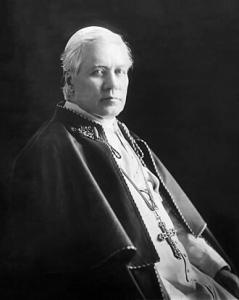
St Pius X
Motto: Instaurare omnia in Christo (“To restore all things in Christ”)
On 20 January 1904, less than six months after his election, Pius X issued the apostolic constitution Commissum Nobis, which prohibited the exercise of the jus exclusivae. Where previous popes had issued rules restricting outside influence on the cardinal electors, Pius X used more thorough and detailed language, prohibiting not only the assertion of the right to veto but even the expression of “a simple desire” to that effect. He set automatic excommunication as the penalty for violating his strictures. He also required conclave participants to swear an oath to abide by these rules and not allow any influence by “lay powers of any grade or order”.
December 17 – Orville Wright flies an aircraft with a petrol engine, the Wright Flyer, at Kitty Hawk, North Carolina in the first documented and successful powered and controlled heavier-than-air flight
Papal Conclave of 1914
- Ballots: 10
- Days: 3
The papal conclave held from 31 August to 3 September 1914 saw the election of Cardinal Giacomo della Chiesa to become pope in succession to Pius X, who had died on 20 August. 57 of the 65 cardinals participated in the balloting. Della Chiesa was elected on the tenth ballot and took the name Benedict XV.
This was the first papal conclave to include a representative from South America: Joaquim Cavalcanti, Archbishop of Rio de Janeiro.
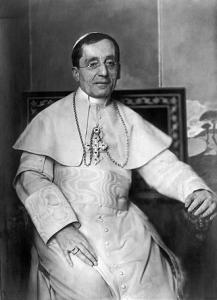
Motto: In Te, Domine, speravi; non confundar in aeternum
(“In Thee, o Lord, have I trusted; let me not be confounded for evermore”)
Subject of the Kingdom of Sardinia, later becoming an Italian citizen. Credited for intervening for peace during World War I. Issued the 1917 Code of Canon Law; supported the missionaries in Maximum illud. Remembered by Benedict XVI as a “prophet of peace”.
Pope Pius X had issued two apostolic constitutions on the subject of papal conclaves. The first, Commissum Nobis of 20 January 1904, eliminated any secular monarch’s claim to a veto over a candidate for election. It established that anyone who attempted to introduce a veto in the conclave would incur automatic excommunication. For the first time in centuries, the cardinals faced no external restraint on their authority.
June 28 – Assassination of Archduke Franz Ferdinand of Austria: Serbian nationalist Gavrilo Princip, 19, assassinates Archduke Franz Ferdinand of Austria and his wife, Duchess Sophie, in Sarajevo, Bosnia and Herzegovina, triggering the July Crisis overnight and eventually World War I. Anti-Serb riots in Sarajevo and Zagreb break out.
Papal Conclave of 1922
- Ballots: 14
- Days: 5
The papal conclave held from 2 to 6 February 1922 saw the election of Cardinal Ambrogio Ratti on the fourteenth ballot as pope in succession to Benedict XV, who had died on 22 January. 53 of the 60 cardinals participated in the conclave. Ratti, the archbishop of Milan, took the name Pius XI and immediately revived the traditional Urbi et Orbi (“to the city and to the world”) blessing from the balcony of St. Peter’s Square, which his predecessors had eschewed since the loss of Rome to Italy in 1870.
Four non-European cardinals did not participate in the conclave. Three of them arrived too late, and one did not attempt the journey. Three weeks after his election, Pius XI issued rules extending the time between the death of a pope and the start of the conclave in order to increase the likelihood that cardinals from distant locations could participate in the next conclave.
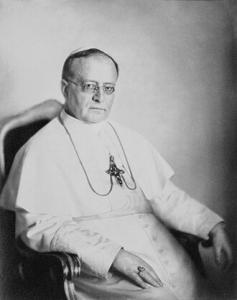
Motto: Pax Christi in Regno Christi
(“The Peace of Christ in the Kingdom of Christ”)
Subject of the Kingdom of Lombardy–Venetia, later becoming an Italian citizen. Signed the Lateran Treaty with Italy (1929), establishing Vatican City as a sovereign state. Inaugurated the Vatican Radio (1931). Refounded the Pontifical Academy of Sciences (1936). Instituted the feast of Christ the King. Opposed Nazism and Communism.
As his first act as pope, Pius XI revived the traditional public blessing from the balcony, Urbi et Orbi, (“to the city and to the world”), abandoned by his predecessors since the loss of Rome to the Italian state in 1870. This suggested his openness to a rapprochement with the government of Italy.
- February 8 – President of the United States Warren G. Harding introduces the first radio in the White House.
- November 14 – The British Broadcasting Company (BBC) begins radio service in the United Kingdom, broadcasting from station 2LO in London.
Papal Conclave of 1939
- Ballots: 3
- Days: 2
The papal conclave held from 1 to 2 March 1939 saw the election of Cardinal Eugenio Pacelli on the third ballot as pope in succession to Pius XI, who had died on 10 February. All 62 cardinals participated in the conclave. Pacelli, the camerlengo and cardinal secretary of state, took the name Pius XII. The day was his 63rd birthday.
The 1939 conclave was the shortest papal conclave in the 20th century, the last papal conclave to include all living cardinals and the first papal conclave to include a cardinal from the Middle East since the Middle Ages: Cardinal Ignatius Gabriel I Tappouni of Syria.
Pacelli was the first pope born in Rome since Innocent XIII in 1721 and the first member of the Roman Curia to become pope since Leo XIII in 1878. Another Curial cardinal would not be elected pope until the 2005 conclave, who took the name Benedict XVI.
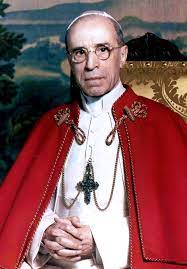
Motto: Opus justitiae pax
(“The work of justice [shall be] peace”)
Italian citizen. Credited with intervening for peace during World War II; controversial for his reactions to the Holocaust. Eliminated the Italian majority of cardinals. Invoked papal infallibility in the encyclical Munificentissimus Deus, defining the dogma of the Assumption. Published the Humani generis (1950), the first encyclical to specifically refer to evolution and took up a neutral position, concentrating on human evolution:
“The Church does not forbid that … research and discussions, on the part of men experienced in both fields, take place with regard to the doctrine of evolution, in as far as it inquires into the origin of the human body as coming from pre-existent and living matter.”
Pius XII had been narrowly elected pope before seeking an additional ballot to demonstrate wider support, and he knew that a very close ballot in the 1914 conclave had raised the question of the impact of a cardinal’s vote for himself. Pius XII promulgated the apostolic constitution Vacantis Apostolicae Sedis on 8 December 1945, more than six years after his election. He made only two significant changes in conclave procedures, otherwise following those established by Pius X on 25 December 1904 with the constitution Vacante Sede Apostolica. ‘
Firstly, he increased the majority required for election from two-thirds of those voting to two-thirds plus one, so that an elector’s vote for himself would be insufficient to produce a two-thirds majority. He also eliminated the rule against voting for oneself, which the two-thirds-plus-one rule obviated.[25][26] It holds, though, that if one had an exact two-thirds majority, not counting one’s own vote, a cardinal could cast the deciding vote for himself. Secondly, from 1621 to 1945, the ballots used to be signed with folded over flaps to conceal the signatures of the electors. Pius XII removed the signature portion of the new form of ballot, so that a completely secret ballot is now cast by each elector with the oath taken at the same moment, now being anonymous. All this is clearly stated in the apostolic constitution Vacantis Apostolicae Sedis promulgated by Pius XII on 8 December 1945
- September 1 – World War II: Germany and Slovakia invade Poland, beginning the European phase of World War II.
- J. Robert Oppenheimer and his student Hartland Snyder publish the Oppenheimer–Snyder model, proving for the first time in contemporary physics how black holes could develop.
Vatican 2 Popes
Papal Conclave of 1958
- Ballots: 11
- Days: 4
A papal conclave was held from 25 to 28 October 1958 to elect a successor to Pius XII, who had died on 9 October 1958. The cardinal electors assembled in Rome and elected Cardinal Angelo Roncalli, the patriarch of Venice, as the new pope on the eleventh ballot. He accepted his election and took the name John XXIII. He was the second patriarch of Venice to be elected pope in the 20th century, after Pius X in the 1903 conclave. John XXIII’s coronation took place on 4 November 1958.
51 of the 53 cardinals participated. The communist governments of Hungary and Yugoslavia prevented Cardinals József Mindszenty and Aloysius Stepinac from traveling to Rome. In comparison with the 1922 conclave, when three cardinals failed to reach Rome in time when the conclave opened 10 days after the pope’s death as required, or the 1939 conclave, when three cardinals reached Rome on the morning the conclave opened 18 days after the pope’s death under new rules, all the cardinals who made the trip reached Rome by 22 October, with few days to spare before the conclave began 16 days after Pius XII’s death.[a][3]
For the first time, the speed of travel matched the internationalization of the College of Cardinals, thanks to advancements in air travel. As one newspaper put it, “The archbishop of New York can reach Rome today faster than the archbishop of Palermo did a generation ago.” This conclave included cardinals from 21 countries compared to 16 at the previous conclave, and 18 non-Europeans compared to seven. The 17 Italians out of 51 represented their lowest percentage since 1455.
Italian citizen. Opened the Second Vatican Council (1962). Called the “Good Pope John”. Issued the encyclical Pacem in terris (1963) on peace and nuclear disarmament; intervened for peace during the Cuban Missile Crisis (1962).

St John XXIII
Motto: Obedientia et pax (“Obedience and peace”)
John XXIII waited several years before issuing a motu proprio to modify certain aspects of the procedures for a papal conclave. In Summi Ponitificis electio, issued on 5 September 1962, he laid out additional rules for impressing all participants with the need for secrecy, even warning the cardinals about communications with their staff (paragraph XIV). His one practical modification reversed his predecessor: Pius XII had required a vote of two-thirds plus one for election; John XXIII returned the margin to two-thirds (paragraph XV).
- March 11 – 1958 Mars Bluff B-47 nuclear weapon loss incident: A U.S. B-47 bomber accidentally drops an atom bomb on Mars Bluff, South Carolina. Without a fissile warhead, its conventional explosives destroy a house and injure six people.
- May 30 – The bodies of unidentified United States soldiers killed in action during World War II and the Korean War are buried at the Tomb of the Unknowns, in Arlington National Cemetery.
- November 20 – The Jim Henson Company is founded as Muppets, Inc. in the United States.
Papal Conclave of 1963
- Ballots: 6
- Days: 3
A papal conclave was held from 19 to 21 June 1963 to elect a successor to John XXIII, who had died on 3 June 1963. The cardinal electors assembled in Rome and elected Cardinal Giovanni Montini, the archbishop of Milan, as the new pope on the sixth ballot. He accepted his election and took the name Paul VI. Paul VI’s coronation on 30 June 1963 was the last papal coronation to date.
Italian citizen. First pope since 1809 to travel outside Italy. Closed the Second Vatican Council (1965). Issued the encyclical Humanae vitae (1968), condemning artificial contraception. Revised the Roman Missal (1969).
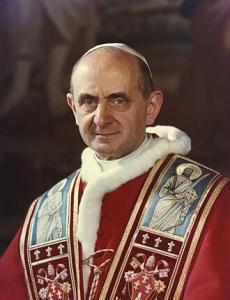
St Paul VI
Motto: Cum Ipso in monte (“With Him on the mountain”)
Pope Paul VI appeared on the balcony shortly afterwards to give his first blessing. On this occasion, Paul VI chose not to give the traditional Urbi et Orbi blessing but instead imparted the shorter episcopal blessing as his first apostolic blessing.
- November 22 – Assassination of John F. Kennedy: In a motorcade in Dallas, Texas, U.S. President John F. Kennedy is fatally shot by Lee Harvey Oswald, and Governor of Texas John Connally is seriously wounded at 12:30 CST. Upon Kennedy’s death, Vice President Lyndon B. Johnson becomes the 36th president of the United States. A few hours later, President Johnson is sworn in aboard Air Force One, as Kennedy’s body is flown back to Washington, D.C. Stores and businesses shut down for the next four days, in tribute. Authors Aldous Huxley (Brave New World) and C.S. Lewis (Chronicles of Narnia) also die that day.
- November 23 – On BBC Television in the United Kingdom:
- William Hartnell stars as the First Doctor in the very first episode of science fiction series Doctor Who[5] (first of the 4-part serial An Unearthly Child). So many people complain of having missed it (because of the disruption to schedules caused by the assassination of John F. Kennedy) that the following Saturday episode 1 is repeated before the broadcast of episode 2. Doctor Who runs until 1989 and is revived from 2005.
Papal Conclave of August 1978
- Ballots: 4
- Days: 2
A papal conclave was held from 25 to 26 August 1978 to elect a successor to Paul VI, who had died on 6 August 1978. It was the first of the two conclaves held that year. The cardinal electors assembled in Rome and elected Cardinal Albino Luciani, the patriarch of Venice, as the new pope on the fourth ballot. He accepted his election and took the name John Paul I.
It was the first conclave since the promulgation of Ingravescentem aetatem (1970), which made cardinals who had reached the age of 80 by the day the conclave began ineligible to participate in the balloting. There were 15 cardinals excluded by that rule. The number of votes cast for Luciani on the final ballot was so great that even a theoretical uniform opposition of these 15 cardinals would not have changed the outcome.
Italian citizen; last Italian pope. First pope born in the twentieth century. Abolished the papal coronation and opted for the papal inauguration. First pope to use “the First” in his papal name; first with two names for his two immediate predecessors. Last to use the sedia gestatoria.
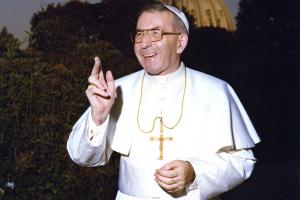
Bl. John Paul I
Motto: Humilitas (“Humility”)
This was the first conclave since 1721 in which three future popes participated–John Paul I, John Paul II, and Benedict XVI–and the first since 1829 in which two did so.
- March 1 – Charlie Chaplin‘s remains are stolen from Cosier-sur-Vevey, Switzerland
- March 8 – The first radio episode of The Hitchhiker’s Guide to the Galaxy, by Douglas Adams, is transmitted on BBC Radio 4.
- April 7 – U.S. President Jimmy Carter decides to postpone production of the neutron bomb, a weapon that kills people with radiation, but leaves buildings relatively intact.
Papal Conclave of October 1978
- Ballots: 8
- Days: 3
A papal conclave was held from 14 to 16 October 1978 to elect a new pope to succeed John Paul I, who had died on 28 September 1978, just 33 days after his election. Upon the pope’s death, the cardinals who were in Rome met and set a date for the beginning of the conclave. All of the 111 eligible cardinal electors attended. On the eighth ballot, the conclave elected Cardinal Karol Wojtyła, the archbishop of Kraków. The third pope in the year, Wojtyła accepted his election and took the name John Paul II. This was the latest conclave to include all eligible cardinal electors.

St John Paul II
Motto: Totus tuus (“Totally yours”)
Polish citizen; first pope of Slavic origin. First non-Italian pope since Adrian VI (1522–1523). Travelled extensively, visiting 129 countries during his pontificate. Third-longest reigning pope after Peter and Pius IX. Founded the World Youth Day (1984) and the Pontifical Academy of Social Sciences (1994). Canonized more saints than any of his predecessors. Youngest individual to start his papacy since Pius IX (1846).
- November 18 – In Guyana, Jim Jones leads his Peoples Temple cult in a mass murder–suicide in his commune, Jonestown, that claims 918 lives in all, 909 of them at Jonestown itself, including over 270 children. Representative Leo J. Ryan is assassinated by members of Peoples Temple shortly beforehand.
- December 15 – Superman: The Movie is released in cinemas in the United States.
21st Century Popes
Papal Conclave of 2005
- Ballots: 4
- Days: 2
A papal conclave was held on 18 and 19 April 2005 to elect a new pope to succeed John Paul II, who had died on 2 April 2005. Upon the pope’s death, the cardinals of the Catholic Church who were in Rome met and set a date for the beginning of the conclave. Of the 117 eligible cardinal electors, those younger than 80 years of age at the time of the death of John Paul II, all but two attended. On the fourth ballot, the conclave elected Cardinal Joseph Ratzinger, the dean of the College of Cardinals and prefect of the Congregation for the Doctrine of the Faith. After accepting his election, he took the name Benedict XVI. Ratzinger was the first member of the Roman Curia to become pope since Pius XII in the 1939 conclave.
German citizen; first German pope since Stephen IX (1057–1058). Promoted the use of Latin and reintroduced several papal garments that had fallen into disuse. Elevated the Tridentine Mass to a more prominent position (2007). Authorized the formation of the Anglican ordinariates (2009). First pope to renounce the papacy since Gregory XII (1415); first to do so on his own initiative since Celestine V (1294), becoming pope emeritus. Died on 31 December 2022, aged 95; longest-lived pope on record.
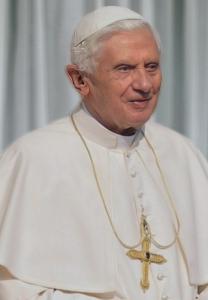
Motto: Cooperatores veritatis (“Cooperators of the truth”)
Although the conclave cardinals may elect any baptized Catholic male, hey have elected only a fellow cardinal since the 1389 conclave. Observers of papal elections tend to consider, by a variety of criteria, some cardinals to be more likely to become pope than the others – these are the papabili, the plural for papabile, an Italian word loosely translated as “pope-able”. Since the set of papabili is a matter of speculation from the press, the election of a non-papabile is not uncommon; recent cases are John XXIII in 1958, and both John Paul I and John Paul II in 1978.
Cardinal Jorge Mario Bergoglio, the archbishop of Buenos Aires who would later become Pope Francis in the 2013 conclave, was also considered to be a papabile.
- January 1 – Jeanna Giese from Wisconsin, United States, comes home from the hospital and officially becomes the first person to ever survive rabies without a vaccination.
- April 23 – The first ever YouTube video is uploaded, titled Me at the zoo.
Papal Conclave of 2013
- Ballots: 5
- Days: 2
A papal conclave was held on 12 and 13 March 2013 to elect a new pope to succeed Benedict XVI, who had resigned on 28 February 2013. Of the 117 eligible cardinal electors, all but two attended. On the fifth ballot, the conclave elected Cardinal Jorge Mario Bergoglio, the archbishop of Buenos Aires. After accepting his election, he took the name Francis.
First pope born outside Europe since Gregory III (731–741) and the first from the Americas; first pope from South America and the first from the Southern Hemisphere. First pope from a religious institute since Gregory XVI (1831–1846); the first Jesuit pope. First to use a new and non-composed papal name since Lando (913–914). Facilitated the Cuban thaw (2015–2017). Eliminated the European majority of cardinals. First pope to visit and celebrate a Mass on the Arabian Peninsula.
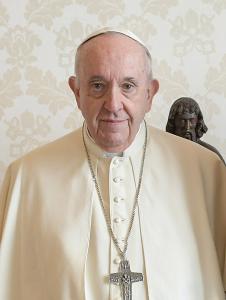
Motto: Miserando atque eligendo (“By having mercy and by choosing”)
In 1996, Pope John Paul II in Universi Dominici gregis fixed the start date of the conclave at 15 to 20 days after the papacy became vacant. The 2013 conclave was initially expected to start sometime between 15 and 20 March 2013. On 25 February, the Vatican confirmed that Pope Benedict XVI issued his motu proprio, Normas nonnullas, to allow for a schedule change. This gave the College of Cardinals more latitude, once all of the cardinal electors had arrived in Rome, to start the conclave earlier or later. They scheduled the conclave to begin on 12 March.
Benedict XVI also amended the conclave law to provide for the automatic excommunication of any non-cardinal who breaks the absolute oath of secrecy
- February 21 – American scientists use a 3D printer to create a living lab-grown ear from collagen and animal ear cell cultures. In the future, it is hoped that similar ears could be grown to order as transplants for human patients with ear trauma or amputation.
- April 15 – Boston Marathon bombing: Two Chechnya-born Islamist brothers (one a United States citizen) detonate 2 bombs at the Boston Marathon in Boston, Massachusetts, in the United States, killing 3 people and injuring 264 others.
Papal Conclave of Jubilee Year 2025
- Ballots: 1
- Days: 4
Reflections On The Election Of Pope Leo XIV |
A Reflection On The Election Of Pope Leo XIV.
There has been Internet betting on the next pope – betting on papal elections has a long history. Even before the announcement of the conclave itself prediction markets were using market mechanisms to calculate both who might be in the running and their putative rankings. The betting market reflects a widespread cultural fascination with the papacy.
Fantapapa (Italian for “Fantasy Pope”) is a fantasy league based in Italy for betting nominal sums on papal conclaves. Established by anti-gambling advocates Pietro Pace and Mauro Vanetti specifically for the 2025 conclave, the sole payout is “eternal glory”. By 5 May 2025, it had 75,000 players in Italy, where no licensed platform offers gambling on conclaves.
- January 19 – TikTok, CapCut, Lemon8, and Marvel Snap are banned off of all app stores in the U.S. due to their owner being ByteDance.


- January 20
- Trump is inaugurated in Washington, D.C. as the 47th president of the United States for a second, non-consecutive term, with JD Vance sworn in as the 50th vice president of the United States


